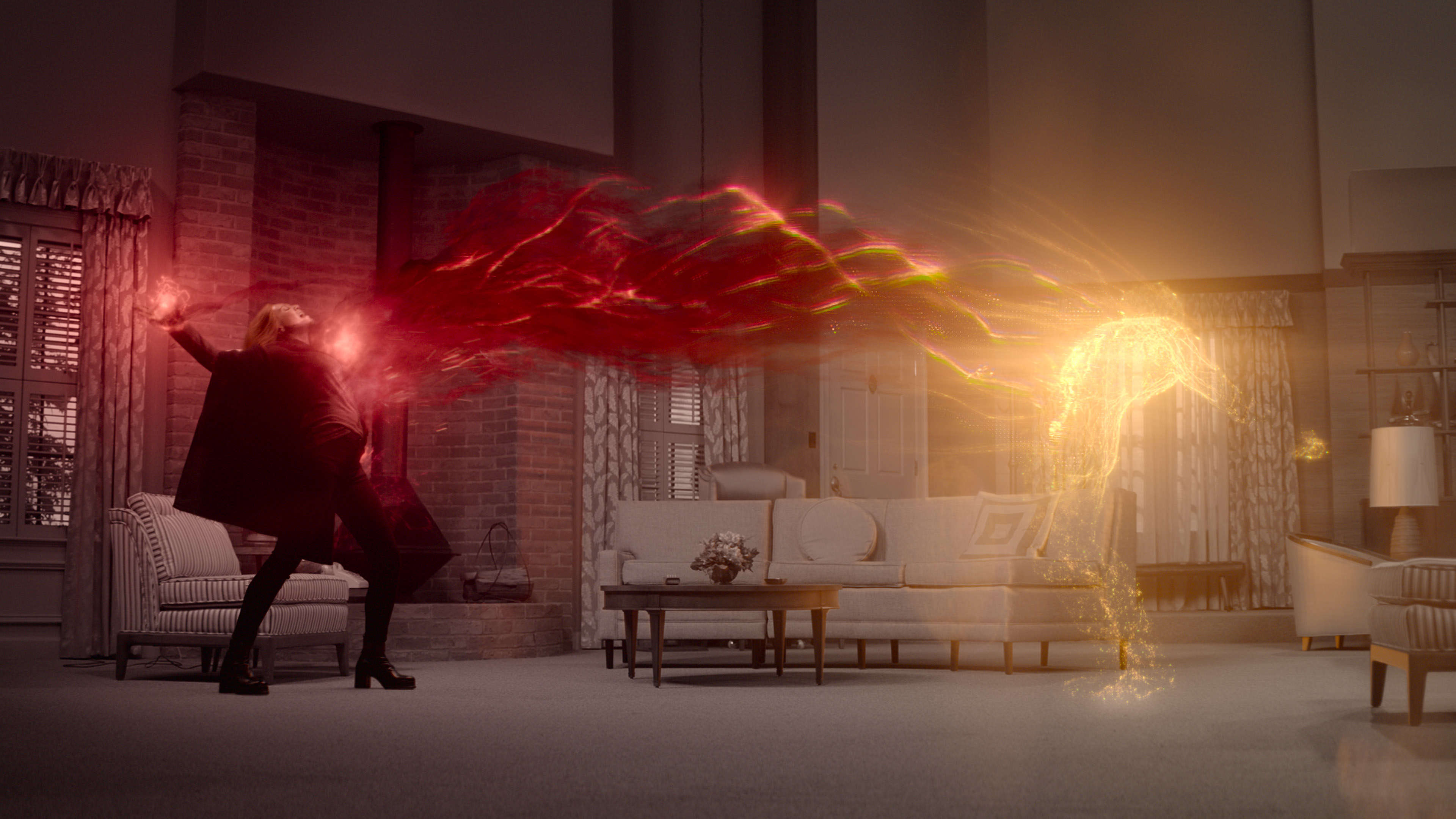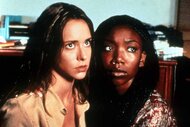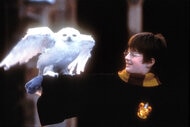Create a free profile to get unlimited access to exclusive videos, sweepstakes, and more!
WandaVision isn’t just the next phase of Marvel TV. It’s the next phase of TV itself.

We were told it was going to be big — though the build-up bordered on superhero-sized hyperbole back in 2019 when Marvel Studios announced a full line-up of Disney+ TV shows in Hall H at San Diego Comic-Con.
Guess we should've believed the hype.
Seeing Marvel Studios' first major project on Disney's streaming service — the sitcom-inspired, reality-warping thriller WandaVision — it makes more sense why the studio opted to sunset pretty much its entire TV lineup before launching these new MCU-connected series. That meant saying goodbye to Netflix's Defenders-centric shows, as well as ABC (Marvel's Agents of S.H.I.E.L.D.) and Hulu's (The Runaways, Helstrom) slates.
The move came after Marvel Studios head Kevin Feige finally took the reins of Marvel TV following the departure of longtime division chief Jeff Loeb. Looking back, it's clear now how Feige saw the TV medium not just as an extension of the Marvel brand but as a storytelling tool that could keep the ouroboros that is the Marvel Cinematic Universe living and breathing in-between blockbuster film releases.
This new phase of the MCU is set to continue expanding out for years to come, with The Falcon and Winter Soldier and Loki later this year, followed by Hawkeye, Ms. Marvel, Moon Knight, She-Hulk, Secret Invasion, Iron Heart, Armor Wars, and plenty more to keep us in big-budget MCU adventures well into 2022 and beyond.
There's no denying, though, this new era came at a cost. Loeb oversaw a largely successful and acclaimed run at the top of Marvel TV, which spawned the Netflix corner of the Marvel Universe that featured shows like Jessica Jones and Daredevil; the launch of acclaimed cult hits Agents of S.H.I.E.L.D. and Agent Carter at ABC; and smaller projects such as Hulu's Runaways and Legion at FX. It was a fantastically creative time for the Marvel IP, and it spawned some fantastic shows that explored different corners of the Marvel canon, typically telling more street-level or cerebral stories that didn't always require universe-ending, theater-viewing stakes.
When Marvel Studios took control of the TV division, pretty much all of that came to an end. Future plans for the Netflix shows in the Defenders-verse quickly wrapped, Agents of S.H.I.E.L.D. had its endgame planned out already, and in-the-works projects like a Ghost Rider spinoff at Hulu were shut down just as production was ramping up. Only the critically panned Hulu series Helstrom made it to completion in that time of flux — though it seems to have bookended the "old" era of Marvel TV with more of a whimper than a splash.
Put simply: The decision to wrap up pretty much every Marvel TV project aside from the Disney+ shows was a bold one, and it left plenty of fans upset (and many undoubtedly still are, holding out hope for more Daredevil or Punisher down the line). But as WandaVision ends its first season, and the studio gears up for the launch of the blockbuster-worthy action epic The Falcon and the Winter Soldier, it's clear why it had to happen.
The next era of Marvel TV isn't in smaller stories or street-level adventures. We've had that, we've loved it, and sure, we'd still like to see more of it at some point. But for right now, Marvel TV is something more. It's an expansion of Marvel Studios' blockbuster machine, effectively doubling the amount of gigantic Marvel stories being told, with half of that material just shifting off the big screen to anchor the Disney+ service.
Most importantly, they're weaving in and out of the movies seamlessly.
Yes, we've already seen Marvel movie characters on TV before — Nick Fury (Samuel L. Jackson) and Sif's (Jaimie Alexander) cameos on S.H.I.E.L.D. being the most obvious. But it always felt like a... stretch when S.H.I.E.L.D. cut in MCU movie footage, most notably around the events of Captain America: The Winter Soldier, the only truly major crossover between the series and the films. It felt like you were watching a TV show splicing in movie footage, with everything from the effects work to the scope feeling out of sync.
But when WandaVision cuts to a flashback from Avengers: Endgame or Avengers: Age of Ultron? It just works. Top to bottom, the series feels like it's of the same caliber and in the same world as the MCU movies. The movie stars aren't cameoing — they're starring. The story isn't a side adventure — it's actively moving the MCU into its next phase, and we'll see that fallout (the introduction of S.W.O.R.D. for example) ripple through the movie universe.
A new kind of "TV"
The MCU has spent a mind-boggling 23 films (and counting!) building out an expansive world filled with more characters and stories than any two-and-a-half-hour film could ever hope to contain. Disney+ is the solution to a problem we didn't even really realize was a problem. WandaVision took two of the most under-utilized members of the Avengers to tell a story that could've never worked as a film: A psychological drama, love story, horror, sci-fi, thriller, sitcom that will make you openly weep like a child in the way it deals with grief. It's a story of MCU scope and scale, but you get the dignity of crying your eyes out in your own home instead of in the theater as it unfolds.
It's not simply "TV" (no disrespect to TV intended), it's something unique in a way we've never really seen. There has been big-budget, prestige TV with film-caliber effects and scope before — shows like Game of Thrones, The Expanse, and Lost come to mind — but never TV that connected directly, effortlessly with a blockbuster film universe and featured effects that could fit just as seamlessly in a $200 million movie.
It's a step beyond even what Disney has done with The Mandalorian, which expanded the Star Wars mythos into big-budget, live-action TV. The Mandalorian focused on new characters in a new corner of that film universe, whereas WandaVision is more the equivalent of if they'd made a Star Wars show focused on Daisy Ridley's Rey in the aftermath of Star Wars: The Rise of Skywalker. (Though even the Star Wars universe is getting in on the big screen-connected action soon, with a show focused on Ewan McGregor's Obi-Wan Kenobi from the Star Wars film prequels.)
Disney needed to find a way to make its streaming service stand out while keeping viewers coming back on a weekly basis for new content. Movie releases make a splash (and Disney is dropping plenty of those on Disney+, too!) — but weekly TV rollouts are a critical tool to make using a service a habit, not a one-off. And making "shows" that are basically the next chapter in the Avengers saga? There's no more obvious recipe for "must-see" programming. Marvel movies are a cultural zeitgeist, and this lets us all in on the fun every Friday.
They've upped the ante for what viewers expect from the concept of TV itself, and here's hoping that rising tide eventually lifts all ships in new and creative ways.
The past few years of streaming have ushered in the decade of Peak TV, and now thanks to WandaVision, we seem to be moving into something more akin to the era of Blockbuster TV. Yes, it's a shame it cost us the more traditional era of Marvel shows, and there's no doubt TV heroes such as Luke Cage and Cloak and Dagger paved the way for this next step. But the days of small-screen Marvel heroes are over (at least for the time being).
Now is the time for the big-screen heroes and big-screen stories — even if they are technically on the small screen sometimes.

























